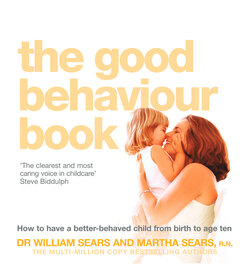Читать книгу The Good Behaviour Book - Марта Сирс - Страница 26
2. Breastfeed Your Baby
ОглавлениеThere is a special connection between breastfeeding and discipline. Promoting desirable behaviour requires that you know your child and help your child feel right. Breastfeeding helps you get to know your baby and provide the response that helps him feel right.
Discipline benefits to mother. Breastfeeding is an exercise in baby-reading. Learning about your baby’s needs and moods is an important part of discipline. Part of learning how to breastfeed is learning to read your baby’s cues rather than watching the clock. You learn to read her body language so that you can tell when she needs to feed, when she’s had enough, and when she just wants to feed for comfort. One veteran disciplinarian told us, “I can tell her moods by the way she behaves at the breast.” Baby gives a cue asking for food or comfort, and you respond by offering to feed. After hundreds of these cue-response practice sessions, your responses become completely natural. What was initially a mental exercise (“Is she hungry? Restless? Upset? I wonder what she needs”) eventually becomes an intuitive response. A flow of communication develops between the little person in need and the big person who is in a position to meet those needs. You get in harmony with your baby.
This harmony is especially helpful if you need to overcome preconceived fears of spoiling that restrain you from naturally responding to your baby. Jan, a first-time mother whom I talked with at a prenatal interview, had a lot of hang-ups from her past that threatened to interfere with her enjoyment of motherhood. She had been on a rigid schedule as a baby, and control was the big issue in her childhood. Jan was now entering motherhood feeling that her main task as a parent was to be sure that her baby did not control or manipulate her. She feared that picking up the baby whenever she cried would result in spoiling. As part of her parenting plans, she was going to train her baby to soothe herself by letting her cry it out. She also planned to put the baby on a feeding schedule, called parent-controlled feeding, and she felt this would be easier to do if she bottle-fed. She thought this would ensure that she would be in charge, and not the baby. I explained that in order to be “in charge” of her baby she had to get to know her baby and become intuitively responsive. Jan changed her mind and decided to give breastfeeding a try. I’m happy to report it not only worked very well for baby but was also therapeutic for Mummy.
The right chemistry. Breastfeeding stimulates your body to produce prolactin and oxytocin – hormones that give your mothering a boost. These magical substances send messages to a mother’s brain, telling her to relax and make milk. The levels of these substances go up during breastfeeding and during other motherly activities such as looking at and caressing the baby. They may form a biological basis for the term “mother’s intuition”. Your reward for spending time touching and enjoying your baby and breastfeeding frequently is a higher level of “feel-good” hormones. A prominent psychotherapist we interviewed revealed her observation that “breastfeeding mothers are better able to empathize with their children”.
Discipline benefits for your baby. Baby’s cues for food and comfort are met, so naturally baby learns to trust. Because he spends many hours each day at the breast, he feels valued and “in touch”. Baby feels right, and this inner feeling of well-being translates into desirable behaviour. Over my twenty-two years in paediatric practice I have observed how mellow breastfeeding babies are, especially toddlers who breastfeed through their second year. A nursing toddler seems to be at peace with himself and with his caregivers. Although in the last century of Western culture we have learned to think of breastfeeding in terms of months or even weeks, historically, in most cultures, babies have nursed for at least two or three years. The behaviour-improving effects of breastfeeding have been known for millennia. You will find breastfeeding particularly useful as a discipline tool when a toddler is going through the stage where he is easily frustrated or when his newfound independence frightens him. We knew a secure and independent two-and-a-half-year-old child who after experiencing a setback such as a toy squabble would come to his mother for consolation saying, “Nursie ’bout it.”
